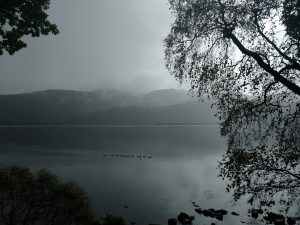 You know when you’re driving along in the rain—the kind that your wipers can’t really cope with, and they go into a sort of frantic ineffectual fastwipe which is slightly silly, somehow, in the way that a powerwalk is—and you see walkers trudging along the verge, heads bowed, sheathed almost entirely in rustling nylon, their huge packs, also nylon-sheathed, rearing behind them like a doom they can’t shake; and you think casually, in passing, ‘Poor bastards’? Well. On day three of the pilgrimage, those poor bastards were us.
You know when you’re driving along in the rain—the kind that your wipers can’t really cope with, and they go into a sort of frantic ineffectual fastwipe which is slightly silly, somehow, in the way that a powerwalk is—and you see walkers trudging along the verge, heads bowed, sheathed almost entirely in rustling nylon, their huge packs, also nylon-sheathed, rearing behind them like a doom they can’t shake; and you think casually, in passing, ‘Poor bastards’? Well. On day three of the pilgrimage, those poor bastards were us.
On a trip to Stockholm last year, a friend and I shared a room so tiny that if one of us wanted to dress, get something out of a case, or indeed do anything at all, the other one had to go back to bed. The hostel room wasn’t quite that small, but it was close so, as Margaret and I got ready to leave, it was like being in one of those puzzles with a grid of movable tiles minus one, where your task is to reassemble the picture. In a wordless ballet of cooperation we shuffled around, rummaging and rustling and generally making preparations for the full-on weather outside. Margaret got herself into some waterproof trousers—or crispy legs, as I call them—and I did a trousers/shorts swither, eventually going for shorts because, hey, I’m never cold these days, and because legs dry more easily than clothes. In a nerdy sort of a way I was secretly a bit chuffed to be able to try out my rucksack’s rain cover (first time I’d had one of those!) which lived, pleasingly, in a pocket in the rucksack’s base, and was now to come into its own.
Somehow it’s harder to set out when it’s already raining than it is to carry on if you’re already out when it starts to rain. Still, off we went, picking our way to the first section of path which, more or less following the River Derwent, was rocky, rain-slicked and treacherous. The rain fell in a committed, thoroughly Cumbrian, no-fucking-around sort of a way, so there was no enjoying—or indeed perceiving—the views about which Geraldine was enthusing. But the sodden woods were green and lovely, the RHS was well under control, and the RLTS was not currently disabling. After a mile or so we paused to consult the map and lo! (you guessed it) a man appeared, mysteriously as the shopkeeper in Mr Benn. Without breaking stride he pointed out the path we should be taking. What is that? How did he “know” a) where we were going and b) that we didn’t know?
In Men Explain Things to Me—which I have now read—Solnit emphasises: ‘I love it when people explain things to me they know and I’m interested in but don’t yet know; it’s when they explain things to me I know and they don’t that the conversation goes wrong’. Yes, Rebecca, yes. In this case I’m sure the MWCTUFU did know something about the paths; it’s the twin assumptions that he knew what I needed to know, and that I didn’t, which I object to. My nephew recently reminded me of a long, snowy hike we did a few years ago in an Ontario National Park, during which a man we met on the trail—walking with his mute and (I imagine) longsuffering companion—dilated about how ill-advised our footwear was (which was bollocks), what we should have been wearing &tc., &tc.. ‘Thank you for your unsolicited advice’, I zipped straight back at him (apparently; I’d forgotten). Retrospectively, I feel proud of myself. On this occasion, Margaret and I simply shook our pretty little heads, and moved on.
Coffee stop, then more trudge; but the rain did ease and eventually the cag was off. The path led us across some boggy patches, duckboarded in places, down through Manesty woods—mixed broadleaf, lush with fern—and to the edge of Derwentwater, 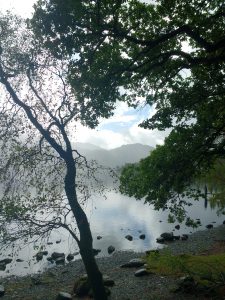 where it meandered along the shore for a couple of miles. Mist more or less hid the fells on the other side from view, but there was a strange beauty to the cloud-shrouded landscape, and you could imagine the Hound of the Baskervilles snoring somewhere, gathering strength for his next lope out into the murk.
where it meandered along the shore for a couple of miles. Mist more or less hid the fells on the other side from view, but there was a strange beauty to the cloud-shrouded landscape, and you could imagine the Hound of the Baskervilles snoring somewhere, gathering strength for his next lope out into the murk.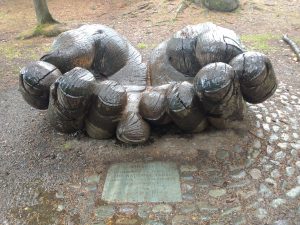 We passed the National Trust sculpture at Brandelhow, then cut up away from the shore, paused for some calories, and continued round the foot of Catbells (hello! climbed you this summer!) and headed for Portinscale. More woods, some meadows with soggy sheep—heads down, intent on the serious business of eating—and then we arrived at a marina where the many notices bristled at us about not even dreaming of sneaking a pee in their “facilities”. Welcome to Derwent Water Marina.
We passed the National Trust sculpture at Brandelhow, then cut up away from the shore, paused for some calories, and continued round the foot of Catbells (hello! climbed you this summer!) and headed for Portinscale. More woods, some meadows with soggy sheep—heads down, intent on the serious business of eating—and then we arrived at a marina where the many notices bristled at us about not even dreaming of sneaking a pee in their “facilities”. Welcome to Derwent Water Marina.
The rain started again. The crispy legs went back on; I re-cagged. On the way out of the village I was eating my sandwich and crisps (yesssss! two days in a row) when, without warning, the RLTS went off the dial. I think I actually yelped. With Margaret’s help I hobbled to a wall where with great trepidation and much pain I investigated. Nooooo, not good. I won’t go into too much detail—some of you, after all, may also be eating—but suffice it to say this was now something I felt even Philoctetes would have called NHS Direct about. It really felt too painful to walk with anything approaching my normal gait—nearly, to walk at all. What to do?
We proceeded slowly and tentatively along the riverside path, under the A66, across a field. It wasn’t pretty. ‘You don’t really look like someone who should be walking another five miles,’ said Margaret, gently. She was probably right but my stubbornness—which I’m re-branding as determination—was engaged. I didn’t want to give up. I might be channelling Lurch, but I was going to get on with it. And thus we entered what would prove to be a fairly extended Nadir Zone.
For Geraldine chose this point to lose it: her instructions for the next section bore no relationship to the actual terrain in front of us, and we limped, winced and stumbled around a series of tussocky, rain-soaked, turd-splatted fields in an increasingly grumpy and disconcerted state. We cursed her; we laughed bitterly; we ceased laughing; we conceded that we were lost. We puzzled for so long over my copy of Geraldine that she was reduced to a pulpy, illegible mass of paper. We double-checked on the map. Where the hell were we? Where should we be? Did we need a MTCTUFU, after all?
Somehow—by dint, perhaps, of being slightly panicky and real, with ourselves and each other—we got ourselves into state where we could come up with a plan. Eventually we managed to find a barn we’d been looking for, nervously crossed a field with some frisky-looking teenage boy cows, and reverse-engineered our way back onto Geraldine’s instructions. With a great sense of pride and triumph we arrived at the gate we needed to go through. There was a wide, deep pool of shite and mud in front of it, but at this opportune moment—and sent, perhaps, by St Bega—a non-patronising man arrived. He also needed to go through the gate, and simply did the boldly going thing, right into the ankle deep slurry, from where he opened the gate. There’s something so utterly different about assistance offered from alongside, as opposed to advice dispensed from on high. With thanked him with great sincerity, and walked on.
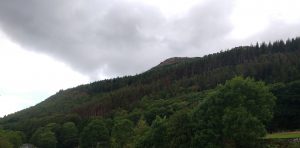 The slog continued, across a field of grass so long unmown that you had to lift your feet very high—which, what with a dodgy knee ligament and the doomed foot (perspective somewhat absent at this point),was very hard work. I waded across it, then toiled up a long, metalled track to where our route met the A591 at something called Dancing Gate. Sounded poetic and lovely. In fact, it turned out to be a rather dismal looking set of buildings squatting by the roadside at a relatively straight section where the cars went whizzing past and threw up sheets of cold grey water. Just as we were doing this brief, main-road-side section, the rain increased exponentially, almost to hail level, and the wind threw it violently into our squinting faces. The ‘poor bastards’ moment was upon us.
The slog continued, across a field of grass so long unmown that you had to lift your feet very high—which, what with a dodgy knee ligament and the doomed foot (perspective somewhat absent at this point),was very hard work. I waded across it, then toiled up a long, metalled track to where our route met the A591 at something called Dancing Gate. Sounded poetic and lovely. In fact, it turned out to be a rather dismal looking set of buildings squatting by the roadside at a relatively straight section where the cars went whizzing past and threw up sheets of cold grey water. Just as we were doing this brief, main-road-side section, the rain increased exponentially, almost to hail level, and the wind threw it violently into our squinting faces. The ‘poor bastards’ moment was upon us.
Speechless with the unpleasantness of it all, we stopped once we’d made it to the side-road for cashew nuts, chemical biscuits and what comfort and self-coaching we could muster. Geraldine then took us back on ourselves, up the side of Skiddaw towards a path into Dodd Wood. ‘Why can’t we just go up the 591?’ wailed Margaret as we climbed higher and higher, in the wrong direction. ‘Yeah, Geraldine’s a bitch,’ I agreed, savagely. At last we left the road to find ourselves wading through chest-high bracken, and still climbing. ‘I don’t think St Bega can have that many followers,’ I muttered bitterly. Over a wall, into another wood, and still climbing. By now Margaret was manually operating her own legs, picking up her thighs in her hands and flopping them over stiles with an air of silent desperation; I, meantime, felt as though my boots had been filled with hot cinders. In mutually-understood torment we laboured up and up until at last the road levelled off above the tree line, and we could—so Geraldine assured us—‘swing along at a good rate’. Yeah, right.
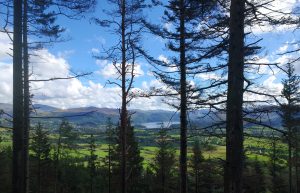 But we did it. We did it! The rain stopped, the clouds cleared, and somehow we made it along these last miles, high enough to catch a first glimpse of Bassenthwaite, then down past the Osprey viewing point—we didn’t even need to discuss this: would have been extra steps—and a parked-up minibus (no keys in the ignition). Finally—and moving more slowly than mould grows—we finished the long descent to the Old Sawmill Tea Rooms and the entrance to Mirehouse, the estate where St Bega’s church is to be found. The end was very nearly in sight.
But we did it. We did it! The rain stopped, the clouds cleared, and somehow we made it along these last miles, high enough to catch a first glimpse of Bassenthwaite, then down past the Osprey viewing point—we didn’t even need to discuss this: would have been extra steps—and a parked-up minibus (no keys in the ignition). Finally—and moving more slowly than mould grows—we finished the long descent to the Old Sawmill Tea Rooms and the entrance to Mirehouse, the estate where St Bega’s church is to be found. The end was very nearly in sight.
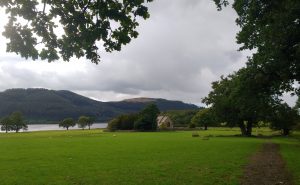 I think it took us a good three quarters of an hour to get that last, what, half a mile, from the road to the church at the lakeside. But eventually, there she was, a small, low building nestled in some trees with the sun glinting off the deep teal water behind. The path to the church took a right-angled bend round the edge of some grass. Shamelessly, Margaret cut the corner, striking across the grass and saving maybe 50 yards. At this stage of proceedings, this was genius of the highest order. I followed.
I think it took us a good three quarters of an hour to get that last, what, half a mile, from the road to the church at the lakeside. But eventually, there she was, a small, low building nestled in some trees with the sun glinting off the deep teal water behind. The path to the church took a right-angled bend round the edge of some grass. Shamelessly, Margaret cut the corner, striking across the grass and saving maybe 50 yards. At this stage of proceedings, this was genius of the highest order. I followed.
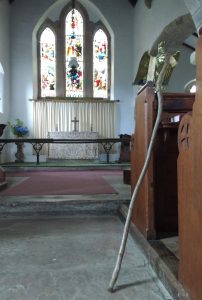 My feelings, on taking off my pack and lowering myself onto a pew, are hard to convey. We were here. We had made it. The sheer ecstasy of it. My eyes filled, my chest heaved—with joy and pride, relief and wonder. I felt emptied, cleared out inside—like an etch-a-sketch with its squiggles erased: wiped to a pristine blankness into which peace trickled, clean and total, slow and sure. This is it, I thought. This is what pilgrimage is for.
My feelings, on taking off my pack and lowering myself onto a pew, are hard to convey. We were here. We had made it. The sheer ecstasy of it. My eyes filled, my chest heaved—with joy and pride, relief and wonder. I felt emptied, cleared out inside—like an etch-a-sketch with its squiggles erased: wiped to a pristine blankness into which peace trickled, clean and total, slow and sure. This is it, I thought. This is what pilgrimage is for.
We were tight for time to make the 555 bus, which runs between Keswick and Kendal, and behind which I’m usually stuck in a long tailback of traffic, crawling along and fulminating about tourists. Today, however, it was a welcome, verging on blessed, sight;— even more so given that the kind and lovely bus driver waited so I could go for a pee before we left. Sitting beside Margaret on the priority seats—‘Please offer this seat to those less able to stand’: yup, we qualified—I felt flooded with grace. For this moment, I knew, utterly and with every cell of my being, that everything is, quite simply, ok. It’s all ok.
Who’d have thought it, eh? Epiphany, on the 555.*
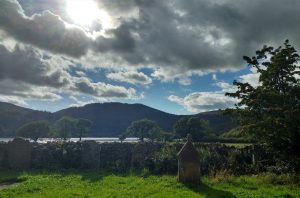
You can read the poem from which this post’s title is taken here.
Wonderful! I couldn’t have done it- kudos to you both, felt I was with you reading it though.
Thanks, Lesley. It was an amazing thing to do. Really gave me confidence that I can do more than I think I can do… x